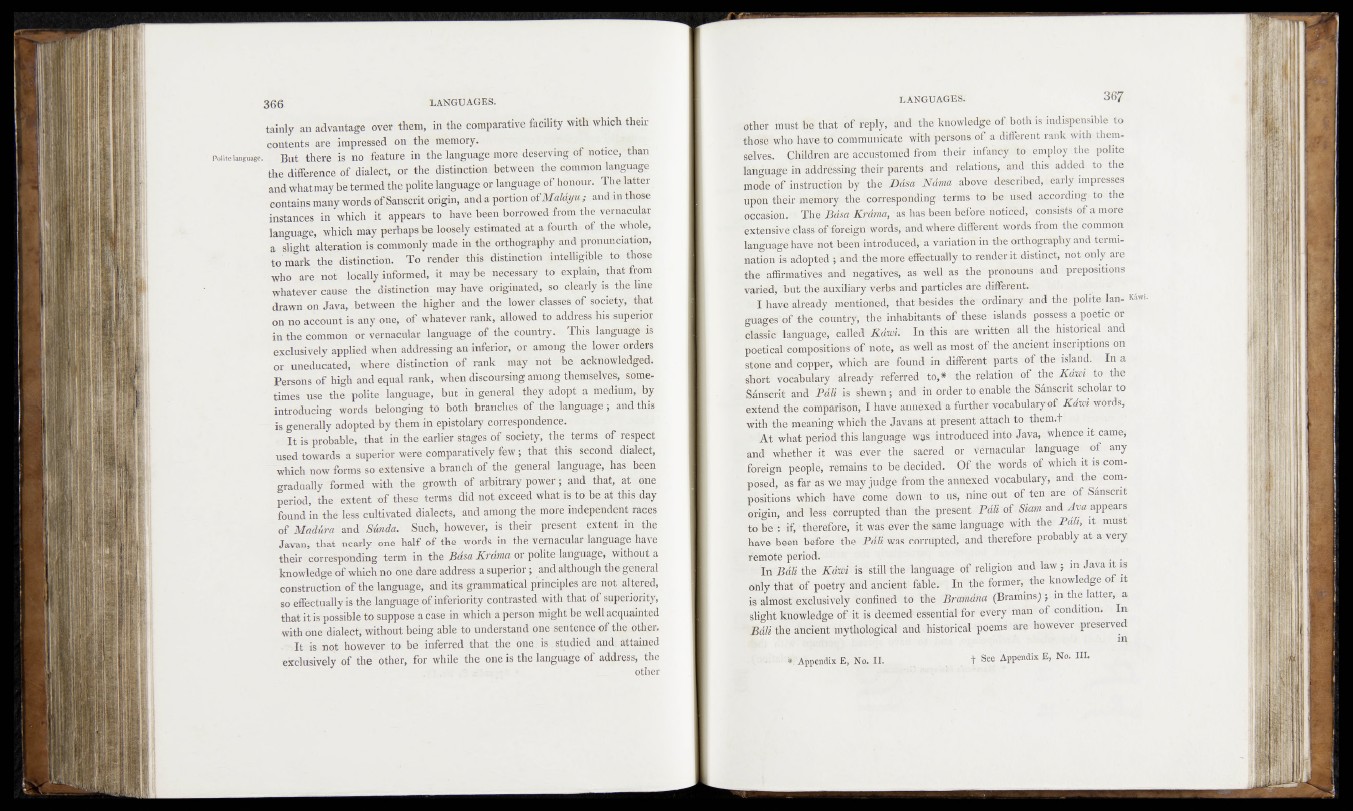
366 LANGUAGESi
Polite language.
tainly an advantage over then?, .in the comparative facility with which their
contents are impressed off „the memory: •• " 1 -
But there is no'feature in the language more deserving c#|np.tine§?ithan
the difference of dialect, .sor'the distinction between the< common,h?nge{ige
and what may tie termedthe politeianguage or-language of .honour. The:latter
contains many words of Sanserit.origin, and a portion oiMal&yuj andin-.th_o,se
instances in which jfc appears to have been borrowed from the»vernacular
language, which may perhaps be loosely estimated at a f fo q r th » the whiole’
a slight alteration is commonly made in the orthography and pronunciation,
tom a rk jh ê distinction. " ’To render “this distinction intelligible torrtho^
who are not locally informed,oiti may be -necessafyfin explain, that ffpm
whatever cause- the distinction may have originated, .so, rifeudjsi? ,th,p % e
drawn on Java, between-the higher and the lower-classes, df'socie^i^hat
on no account is any one, of whatèver rank, allowed to a ^ s ^ a ^ p t
in die common or vernacular- language of the country;^ This- language-1$
exclusively applied when addressing an inferior, 91? among the lower orders
or uneducated, whew» distinction of rank ’may -'not.rhe acknowledged.
Persons of high and equal rank, when discoursing among themselvis, Sometimes
Use the polite language, but in-generalu.tbey adopt' .-armefmhidiBy
introducing words belonging to both branches-of theilanguage ; and tbis_
is generally adopted-by them in epistolary correspondence. ,
* It is probable, that in the earlier stages-ef society, fh^itetinsf sof respect
used towards sC superior were comparatively few; that this ^efcönff<<Hialect,
'which now forms so extensive a branch of the general- language, .has ,been
gradually Tormed-with the growth of arbitraryrpower-; and that, at .6ne
period,- the extent of these terms i d notiexcëed what is to beat this-day
found in'the less cultivated dialects, and among-the,-more independent-arpces
of Madéra and Simla. Such, however, is-their ; present< - extent - in the
Javan, that nearly-one half of the words in the vernacular language -have
their corresponding term in the Bdsa Krdma or polite ianguage, .without, a
knowledge of which no one-dare address a superior; and although the,'general
construction of the language, and its-grammatical principles' ate. not altered,
so effectually is the language of inferiority contrasted with that of superiority,
that it impossible to suppose a case in which a person might ;he .well acquainted
■with one dialectpvithout being able to understand one sentence pftl?©. other.
- It is..not however.to. be inferred that the one. is. .studied':and, attained
exclusively of the other, for while the one is the language of address, the
l a n g u a g e s : 367
mother rnüst #f|" thafiof^e^^- and-the-knowledge of. both is indispensible to
thdsfe-Jwho-havatoTcoihmanifcatC with' pessomof a different rank with thems
e l f phiidren are Ic ^Sw id - Wnii their infahcywta employ-the polite
language ih^dt&ssing their, parent® and relations,^ and< this* added- to- the
mode fof iti^iujgtion -»have. described,pearly impresses
üp'dh théir:metfrhry'.tbeJcorrëâpdrîding ■'terms; to bennsed- according, to the
-occasion: *: Thrilsdsa- 'KrAma, ‘as.has, been ibBtorfiMoticed'd^onsisfe of a more
%Xtenske:fdlaâ^^^^Sg’htw'orÜSi'-,ænid wheÈé'.different words from the common
language hav'eîhotibeérfûntroducê'dÿahvariatioihin tire orthography a,nd termi?
nation is adopted ; and the rhore ’effectually .tosrehderjitldistincti not-.only are
the. affirmatives,, and negatives,f as well'as the pronouns i,and prepositions
vasrie*d,;'Aufc' the^ailxlB&ry verbs"andî particles! are different. -
j«iJ have aIreMy 'Tnéneitinedîj -thatCib'èsidçs1 the'- ordinary: -and the 1 polite. languages'
of tfhe fcohntry, the inhabitants'o^theseiiislands possess a-poetic or
dassi# liinêbàg# Jh7Ébta»wè written, allithe historical and
poetical compôsitiùns-'d&të, --as well as moSt<ofi theanêiçntvinscriptions on
stbhVbnd1'copper, .which are found - in 'different .parts vof^tbe island. In a.
shoft vocabulary already~feferredbto;*; [thq-relationjihf-ithe .Kàwi, to the
iSariscrit and Pâli is shewn 'y'And- in tifder to enablé the .'Sanscrit scholar to
extend'the comparison, I havefannéxëd a' further’ vocabularyof‘ Kam words,
with the meaning which the Javâns a t preSenthtiach to themd" :
I .At what period this language' was; introduced- into Java, whence iticame;
-and- whether it was .eyer the sacred or v’érnâcularr - language- -of! any
' foreign people, remains ito be decided. Of'tbs words' of- which it is com-
. p'oSe'd, as far as we may judgé :from the annexed vocabulary, and the com*
positions - which have’ come'Howh^to .us, bine out - 'of ten1 axe of.SanSsorit
origin, and less corrupted than the present PAliof~Siam-and.^m appears^
th be*/' -if,-‘therefore,' it'was ever the same -language wit.h-.thet P'à-h, it- must
have been before ‘-the Pâli was corrupted, arid-therefore-probably at a very
‘remote period'.'-! ' * -’’ü - îvkj
In BAH the KAm is still the languagehof religion and law 4 m Java it-is
Only that of poetry and ancient fabler . M«the former;, the knowledge of it
is almost exclusively confined- to the BramdM (Bramkis) ; m the latter, a;
slight knowledge of i t is dfeemèd-èssential for- evèrÿ man of [condition. In,
" Bdli the ancient mythological and < historical 'poèms are however preserve
.... • ■ 1 . '; ■ in